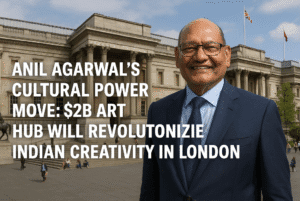Anil Agarwal’s Cultural Power Move: 7 Bold Reasons His $2B Art Hub Will Revolutionize Indian Creativity in London
Vedanta Group Chairman Anil Agarwal, a self-made billionaire with a $2.01 billion net worth, has acquired London’s historic Riverside Studios, transforming it into a global stage for Indian art and cross-cultural collaboration. From humble beginnings in Patna, where he once dreamed of a Bollywood singing career, Agarwal built a mining empire through ventures like Vedanta Resources, reshaping India’s metals industry. His purchase of the 100-year-old Thames-side venue—a cultural landmark that hosted legends like David Bowie—reflects a lifelong passion for creativity. Renamed the Anil Agarwal Riverside Studios Trust, the space will spotlight Indian classical arts, indie films, and global talent, fostering dialogues between traditions.
Beyond business, Agarwal’s philanthropy and focus on democratizing art access underscore his commitment to legacy-building. This venture amplifies India’s soft power, positioning the studio as a bridge between Eastern and Western artistry. By merging his industrial acumen with cultural patronage, Agarwal redefines how billionaires can shape societal narratives, proving ambition and artistry can coexist to inspire generations.

Anil Agarwal’s Cultural Power Move: 7 Bold Reasons His $2B Art Hub Will Revolutionize Indian Creativity in London
In a move blending business acumen with cultural passion, Vedanta Group Chairman Anil Agarwal has acquired London’s century-old Riverside Studios, signaling a bold vision to amplify India’s artistic footprint on the global stage. This acquisition, finalized in January 2025, transcends typical corporate strategy—it’s a deeply personal endeavor for the billionaire, whose unrealized Bollywood aspirations now fuel a mission to bridge cultures through art.
The Acquisition: More Than a Real Estate Deal
Riverside Studios, a storied venue on the banks of the Thames, has hosted icons like David Bowie and avant-garde theatre productions since the 1930s. Now rebranded as the Anil Agarwal Riverside Studios Trust, the space will evolve into a dynamic hub for Indian and international artists. Agarwal’s vision? To create a platform where classical Indian musicians share stages with global Grammy winners and where Bollywood screenings coexist with cutting-edge digital art exhibits. This initiative aligns with India’s growing soft power, offering a physical space to showcase its creative diaspora.
From Scrap Metal to Billionaire: Agarwal’s Unconventional Journey
Agarwal’s story is one of grit and reinvention. Hailing from Patna, Bihar, he arrived in Mumbai as a young man dreaming of a singing career. When Bollywood didn’t come calling, he pivoted to scrap metal trading—a humble start that laid the foundation for Vedanta Resources. By 2003, Agarwal made history by listing Vedanta on the London Stock Exchange, India’s first company to do so. Today, Vedanta’s $12.49 billion empire spans mining, energy, and technology, but Agarwal’s latest venture reveals a softer side: a longing to nurture the arts he once aspired to join.
Business Meets Culture: The Strategy Behind the Vision
Agarwal’s acquisition of Riverside Studios isn’t merely philanthropic—it’s strategic. As India’s economy and cultural influence expand, the venue positions him at the intersection of global art and commerce. The move echoes his business playbook: identifying undervalued assets (like the defunct Victorian iron foundry-turned-studio) and revitalizing them for new purposes. Similarly, his acquisitions of BALCO and Hindustan Zinc transformed India into a metals powerhouse. Now, he applies that same foresight to culture, leveraging London’s status as a global arts capital to elevate Indian talent.
Why This Matters for Global Art
Riverside Studios’ reinvention comes at a pivotal moment. As Western institutions increasingly diversify their programming, Agarwal’s trust could become a conduit for Indian artists seeking international exposure. Imagine Kathak dancers collaborating with British choreographers or Indian indie filmmakers premiering works alongside European auteurs. The venue’s programming, as Agarwal notes, will emphasize “art without boundaries,” fostering dialogue between creatives from disparate worlds.
Philanthropy and Legacy: Beyond Mining
Agarwal’s $2.01 billion net worth funds not just business ventures but also transformative philanthropy. His Anil Agarwal Foundation has pledged billions to healthcare, education, and rural development in India. The Riverside Trust extends this ethos, blending cultural patronage with social impact. By providing residencies and grants, Agarwal aims to democratize access to the arts—a nod to his own roots, where resources were scarce but creativity thrived.
Challenges and Opportunities
Skeptics may question a mining magnate’s foray into the arts. Yet Agarwal’s track record of turning scrappy ventures into successes suggests otherwise. Potential challenges—balancing commercial viability with artistic integrity, appealing to diverse audiences—mirror those he’s navigated in industry. His solution? “Let artists lead,” he stated in a recent interview, emphasizing autonomy for curators and creators.
Conclusion: A New Blueprint for Cultural Leadership
Anil Agarwal’s Riverside Studios venture redefines what it means to be a billionaire in the 21st century. It’s not just about wealth accumulation but legacy-building through cultural stewardship. By channeling his unrealized artistic dreams into a global platform, he offers a template for how business leaders can enrich society beyond balance sheets. As the studio’s lights dim for its first Indian-curated exhibition, one thing is clear: Agarwal’s journey from Patna to London exemplifies how ambition, when paired with purpose, can reshape worlds—both underground and onstage.
You must be logged in to post a comment.